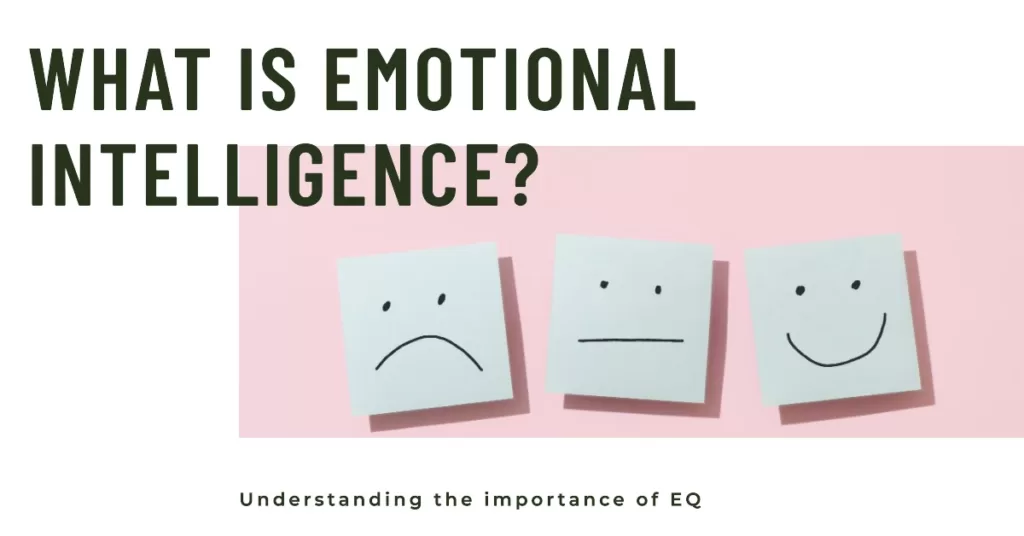Emotional intelligence (EI) is a key trait that can determine success in personal and professional settings. It refers to the ability to recognize, understand, and manage emotions in oneself and others. Those with high EI are often better equipped to handle stress, communicate effectively, build relationships, and make sound decisions. However, not everyone naturally possesses high levels of EI. This is where high-performance coaching for emotional intelligence comes in.
High-performance coaching for EI is a process through which individuals can improve their emotional intelligence skills with the help of a coach who specializes in this area. The goal of this type of coaching is to help individuals develop greater self-awareness, emotional regulation abilities, empathy skills, and social skills so they can thrive both personally and professionally. In this article, we will explore the importance of EI in various settings as well as the benefits and applications of high-performance coaching for EI.
Table of Contents
- 1 Key Takeaways
- 2 What is Emotional Intelligence (EI)?
- 3 Importance of EI in Personal and Professional Settings
- 4 Benefits of High-Performance Coaching for EI
- 5 How High-Performance Coaching for EI Works
- 6 Common Areas of Focus in High-Performance Coaching for EI
- 7 Real-Life Examples of High-Performance Coaching for EI
- 8 Qualities of a Good High-Performance Coach for EI
- 9 Summary
Key Takeaways
- High-performance coaching for emotional intelligence helps individuals improve their emotional intelligence skills with the help of a coach who specializes in this area.
- Emotionally intelligent people can navigate complex social situations with ease and enhance productivity levels by promoting teamwork and reducing conflicts among colleagues.
- High-performance coaching for EI offers a structured and systematic approach to help individuals become more aware of their emotions, recognize the impact they have on others, and develop skills to manage them effectively.
- Common areas of focus in coaching for improving emotional intelligence competencies include enhancing emotional self-awareness, regulation, motivation, empathy, and social skills.
What is Emotional Intelligence (EI)?
The concept of emotional intelligence (EI) refers to the ability to perceive, understand, and manage emotions effectively, which has become increasingly crucial in today’s fast-paced society. EI can be understood as a set of skills that allow individuals to recognize emotions in themselves and others, regulate their own emotions, and use emotional information to guide thinking and behavior.
Research suggests that individuals with high levels of EI tend to have better mental health outcomes, more successful interpersonal relationships, and greater success in the workplace. In addition to that, they are often better equipped to handle stressors and challenges that arise in their personal and professional lives.
There are four core components of EI: self-awareness, self-regulation, social awareness, stress management, and relationship management. Self-awareness involves understanding one’s own emotions, strengths, weaknesses, values, and goals. Self-regulation involves managing one’s own emotions in a way that is appropriate for the situation at hand. Social awareness involves understanding the emotions of others through empathic listening and observation. Relationship management involves using emotional information to communicate effectively with others.
Emotional intelligence is an important set of skills necessary for success both personally and professionally. It allows individuals to navigate complex social situations with ease while maintaining a sense of control over their own emotional state. By developing these skills through coaching or other methods such as mindfulness training or cognitive behavioral therapy (CBT), individuals can improve their overall wellbeing while achieving greater success in all areas of life.
Importance of EI in Personal and Professional Settings
The significance of emotional intelligence extends beyond personal life and influences professional settings as well, making it an essential skill for success in both domains. EI refers to the ability to identify, understand, manage, and utilize one’s emotions effectively. In personal life, it helps individuals build strong relationships with family and friends. However, in professional settings like workplaces or businesses, EI is crucial for effective communication and leadership skills.
The importance of EI in personal and professional settings cannot be overstated. Emotionally intelligent people can navigate complex social situations with ease by understanding nonverbal cues such as body language or tone of voice. They are also adept at managing their own emotions in high-pressure situations while maintaining a positive outlook on life. This quality makes them more resilient than others when faced with challenges.
EI is particularly important in the workplace because it enhances productivity levels by promoting teamwork and reducing conflicts among colleagues. Emotionally intelligent leaders inspire trust from their subordinates through active listening and empathy toward their team members’ needs. Such leaders foster a collaborative work culture that encourages innovation and creativity leading to better business outcomes.
To conclude, emotional intelligence is an essential skill for success both personally and professionally. It plays a crucial role in building healthy relationships with oneself, family members, friends as well as colleagues at work. Therefore, individuals who develop strong EI skills will have a competitive advantage over those who don’t possess these qualities when it comes to achieving success both personally and professionally.
Benefits of High-Performance Coaching for EI
Developing effective coaching strategies can enhance one’s ability to improve emotional awareness and management skills. This is where high-performance coaching for emotional intelligence (EI) comes in. It offers a structured and systematic approach to help individuals become more aware of their emotions, recognize the impact they have on others, and develop skills to manage them effectively. Through personalized feedback, goal-setting, and action planning, high-performance coaching helps individuals identify their strengths and areas for improvement in EI.
One of the key benefits of high-performance coaching for EI is improved self-awareness. Self-awareness is critical for developing emotional intelligence because it allows individuals to understand how their emotions influence their behavior and decision-making. High-performance coaching helps individuals identify patterns in their thoughts, feelings, and actions, which can then be used to develop more effective coping strategies. By understanding themselves better, individuals can also build stronger relationships with others by recognizing how their behavior affects those around them.
Another benefit of high-performance coaching for EI is increased empathy. Empathy involves understanding other people’s perspectives and emotions, which is essential for building strong relationships both personally and professionally. High-performance coaching provides opportunities for individuals to practice empathy through role-playing exercises that allow them to see situations from different perspectives. By developing this skill through coaching, individuals can become more effective communicators who are better able to connect with others on an emotional level.
High-performance coaching for EI can lead to improved performance at work or in other areas of life. By becoming more emotionally intelligent through coaching sessions focused on self-awareness, empathy-building exercises, and goal-setting activities tailored specifically toward improving EI skills among participants; people are able not only to perform well but also handle stressors that might come up during these times as well as being better equipped overall when faced with challenges or setbacks that may arise unexpectedly thereby enhancing productivity levels significantly over time.
Overall, investing time into HPC has numerous benefits beyond just achieving personal growth. Developing emotional intelligence through coaching can lead to stronger relationships, improved communication skills, and better performance in all aspects of life. By taking advantage of this type of training, individuals can be confident that they are investing in themselves while also improving their ability to succeed in today’s complex world.
How High-Performance Coaching for EI Works
One effective approach to enhancing emotional awareness and management skills involves high-performance coaching for emotional intelligence. This type of coaching is a structured and personalized feedback, goal-setting, and action-planning process that aims to improve an individual’s emotional intelligence competencies. High-performance coaching for EI is designed to help individuals understand their emotions better, manage them more effectively, and develop healthier relationships with others.
The process typically starts with an assessment of the individual’s current level of emotional intelligence using standardized instruments. The coach then provides feedback on the individual’s strengths and areas for improvement based on the assessment results. Together, they set goals for improving emotional self-awareness, self-regulation, motivation, empathy, and social skills.
Once the goals are set, action plans are developed to achieve them. The coach helps the individual identify specific behaviors that need to be changed or enhanced to meet their goals. They also work together to develop strategies for maintaining progress toward those goals over time.
HPC for emotional intelligence is a powerful tool for personal growth and development. It provides individuals with the guidance they need to become more emotionally intelligent in both their personal and professional lives. By mastering these skills through coaching interventions like this one can lead individuals toward greater success in various fields while developing meaningful relationships along the way.
Common Areas of Focus in High-Performance Coaching for EI
Common areas of focus in coaching for improving emotional intelligence competencies include enhancing emotional self-awareness, regulation, motivation, empathy, and social skills. The coach helps the individual to identify their emotions accurately and understand how they affect their behavior. Additionally, the coach teaches techniques for controlling emotions so that the individual can make better decisions based on logic rather than feelings.
Another area of focus is motivation. High-performance coaching for EI helps individuals understand what motivates them and how to stay motivated even when faced with challenges. This includes developing a growth mindset that focuses on learning from mistakes and failures rather than being discouraged by them.
Empathy is also an important competency in high-performance coaching for EI. The coach helps individuals develop empathy by teaching them how to put themselves in others’ shoes and see things from their perspective. This leads to better communication and collaboration with others.
High-performance coaching for EI focuses on social skills such as communication, conflict resolution, teamwork, and leadership. These skills are essential in today’s workplace where collaboration is key to success. The coach works with individuals to improve their ability to communicate effectively, resolve conflicts amicably, work well within teams, and lead teams effectively.
All in all, coaching for EI focuses on improving emotional self-awareness, regulation, motivation, empathy, and social skills. By working with a coach who specializes in this area of expertise individuals can learn valuable tools that will help them succeed both personally and professionally. Developing these competencies takes time but it’s worth it because they lead to greater happiness at work and home as well as improved relationships with others which ultimately leads to greater success overall.
Real-Life Examples of High-Performance Coaching for EI
EI coaching is a sought-after approach to developing leaders who can handle complex situations with ease. In the previous subtopic, we discussed common areas of focus in high-performance coaching for EI. This subtopic delves deeper into real-life examples of such coaching. These examples will help you understand how high-performance coaching can help individuals become emotionally intelligent and lead their teams to success.
An example of high-performance coaching for EI is when a leader needs to manage a team member who is facing personal challenges that are affecting their work performance. A coach may work with the leader to develop empathy toward the team member’s situation and teach them how to communicate effectively without being judgmental or dismissive. The result of this type of coaching can be increased trust between the team member and leader, leading to improved communication, productivity, and overall job satisfaction.
Another example could be when a leader needs to have difficult conversations with team members. Coaching can help them build self-awareness around their own emotions during these talks while also developing strategies to engage in productive dialogue with employees who may not receive feedback well initially.
A third example could be when a new manager takes over an existing team where there might already be established routines, expectations, and relationships among team members. HPC can assist the manager in becoming aware of these dynamics so they can navigate them effectively while working toward establishing themselves as an effective leader within the group.
To evoke an emotional response from readers about these real-life examples, here is a table showing before-and-after states that illustrate what happens when leaders embrace high-performance coaching:
| Before | After |
|---|---|
| Absentee leadership | Engaged leadership |
| Poor communication skills | Effective communication skills |
| Low employee morale | Improved job satisfaction |
| Lack of direction/strategy | Clear goals and vision |
By embracing high-performance coaching for EI, leaders have been able to transform themselves from absentee figures into engaged leaders who communicate effectively with their team, resulting in improved job satisfaction and clear goals. These examples demonstrate the power of high-performance coaching for EI, which can help individuals become more self-aware, empathetic, and effective leaders who inspire their teams to achieve great things.
Qualities of a Good High-Performance Coach for EI
Effective development of emotional intelligence requires a high-performance coach who possesses certain qualities that enable them to guide individuals toward becoming more self-aware, empathetic, and inspiring leaders. These qualities include:
- Empathy: A good high-performance coach for EI should be able to relate to their client’s experiences and emotions in order to create a safe space where the individual can explore their feelings without fear of judgment or criticism.
- Active Listening: An effective coach must be an active listener, able to not only hear what their client is saying but also understand it from the client’s perspective. This helps the coach tailor their approach and advice to suit the individual’s unique needs.
- Flexibility: Coaching for emotional intelligence is not a one-size-fits-all process, and as such, a good coach must be flexible enough to adapt their methods to suit each individual’s personality and learning style.
- Encouragement: Developing emotional intelligence can be challenging, and individuals may face setbacks along the way. A good high-performance coach for EI should be able to provide encouragement when necessary so that clients remain motivated throughout the coaching process.
In addition to possessing these qualities, an effective high-performance coach for EI should also have a clear understanding of emotional intelligence concepts such as self-awareness, empathy, motivation, social skills, and self-regulation. This knowledge allows them to guide individuals toward developing these vital skills through targeted coaching techniques.
Ultimately, a successful high-performance coach for EI must have a results-oriented mindset focused on helping clients achieve specific goals related to improving their emotional intelligence. By combining empathy with active listening skills, and flexibility in coaching approaches tailored specifically for each individual and coupled with persistent encouragement toward achieving set goals will help clients develop stronger interpersonal relationships both professionally and personally.
Summary

Emotional intelligence coaching is an effective way to improve EI skills in both personal and professional settings. It provides numerous benefits, including increased self-awareness, better communication skills, enhanced leadership abilities, and improved relationships with others. The process of high-performance coaching for EI involves identifying areas of improvement through assessments and feedback, developing targeted action plans, and implementing strategies to overcome obstacles.
A good high-performance coach for EI should possess strong communication skills, empathy, a non-judgmental attitude, and the ability to motivate individuals toward achieving their goals. To get started with high-performance coaching for EI, individuals can seek out qualified performance coaches who specialize in this area or enroll in programs that offer training on emotional intelligence development. Ultimately, investing time and effort into improving one’s emotional intelligence can lead to greater success both personally and professionally.




